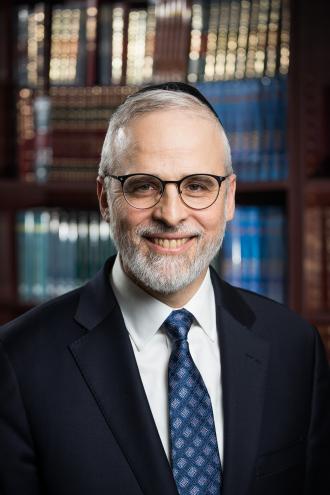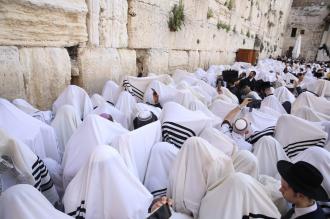So, Moshe went and returned to Jethro, his father in law, and said to him, “Let me now go back to my brethren who are in Egypt, and see if they are still alive.” And Jethro said to Moshe, “Go in peace.”
- Exodus 4:18
Rashi notes that when Moshe was commanded to return to Egypt to lead the people from bondage, he first approached his father-in-law, Jethro, and asked his permission. Astonishing! That the Creator of all should command Moses to deliver B’nai Yisrael from their bondage and before doing so Moshe asked permission from Jethro? It is as if Moshe holds up his hand to God and declares, “Hold on while I see if it’s all right for me to follow your command.”
And if Jethro said, No? What then? Would the Children of Israel continue to languish in slavery?
Moshe understood the urgency of God’s command. But he also knew that he could hardly fulfill God’s command if he fell short of being a mensch. As the Midrash has it, Moshe himself told God, “Jethro accepted me, opened his home to me, and treated me with honor. One owes his life to someone who opens his home to him. Therefore, I cannot go without his permission.”
Indeed, Rav Nosson Tzvi Finkel, the Alter of Slabodka has said that if Moses had not done that, he would have proven himself unworthy of his mission.
Menschlichkeit is not commanded of us; to be a mensch is not encoded in our law. But without being a mensch the performance of our laws is dry and uninspired. Derech eretz kadmah l’Torah. Decency comes before Torah.
Torah cannot be without derech eretz.
Derech eretz can seem almost quaint in our crass, coarse and angry culture, where people are more likely to “shout down” others than listen with open hearts; where angry crowds block roadways, making it impossible for emergency, life-saving vehicles to pass, and for crowds to get to their destinations. No number of laws can ever “force” people to behave decently toward one another. It is not law which makes for civil society but rather a common ethos that underpins the law, a human decency and consideration.
Derech eretz.
We should never confuse derech eretz with mere politeness. “Please.” “Thank you.” The opening and closing of a door for others. These can be expressions of one’s derech eretz. But derech eretz is not performance so much as posture. It is the intent and the consideration that drives our daily lives. It is the lubricant that not only allows the myriad interactions of our lives to go smoothly but that gives those interactions human meaning and worth.
Sadly, it is not only in the secular world that derech eretz is lacking. The same anger, coarseness and meanness we see in daily life seems to have infected religious interactions as well. Rather than respectful and sensitive discussion and, yes, disagreement, we see a “my way or the highway” sensibility. There is none of the respect and regard that is the fabric of our great tradition, where our teachers discussed and disagreed and found every perspective enshrined in our sacred texts! Yes, there is a prevailing, normative view but the “minority” opinion is given its rightful place as well.
Would we be the people we are if only Hillel’s thoughts were part of our tradition, ignoring Shammai?
Sefer Vayikra opens with the varieties of Temple experiences – sacrifices, offerings, creating a relationship with God through coming close to Him via the korbanot. Yet the book’s opening words, Vayikra el Moshe… (And He called to Moshe, and the Lord spoke to him from the Tent of Meeting, saying...) suggests something unspoken in the relationship between God and Moshe, His disciple par excellence. Moshe, the only human who has seen God “face to face”, who communicates directly with God still waits to be called in to hear God’s words.”
The Midrash tells us, “…with respect to any Torah scholar who lacks wisdom, a dead animal is preferred to him. Go and learn from Moshe, the father of wisdom, the father of the prophets, who took Israel out of Egypt and performed miracles. Moshe who went up to heavens and brought down the Torah and occupied himself with building the Mishkan – despite all of this, he did not go inside [the Tent] until he was called, as it says, ‘And He called unto Moshe’.”
Vayikra tells us of the many religious obligations and mitzvoth that are incumbent upon the kohanim as well as every Jew in exquisite detail but before we can learn any of that there is derech eretz. Before the myriad of positive and negative mitzvoth there must be derech eretz.
This is true for Moshe Rabeinu. It is true for you and me.
Even the most noble of deeds, if performed without derech eretz, is as valuable as “a dead animal.”
When we see the pushing, shoving, yelling and screaming at various “religious” functions, when we see so-called students of Torah extol their views and hashkafa with reprehensible tactics, we see not what is noble, good and sacred about Judaism. We see “a dead animal.”
At the beginning of Sefer Devarim Moshe revisits the consequential events throughout the making of the Jewish people not as an exercise in history but as a map going forward so that when he leaves them they will have the lessons of the past to guide them into the future. The most important is to consider the decision to send the Meraglim, contrary to God’s will. This lack of trust in the Ribono shel Olam was such a grave national mistake that its reverberations continue even to today. It is incomprehensible that they could discount all that God had promised the Avot and from His first revelation to Moshe at the Burning Bush and then consistently through their redemption from Egypt and beyond, that the Land would be theirs only to rely instead on the report of twelve mortals…
In recounting this tragic episode, Moshe begins with the words, And all of you approached me and said, Let us send men ahead of us that they shall search out the land for us... He does not begin by recounting the facts of the event but rather by speaking about how “you approached me…”.
And how did the people approach him? Vatikrevun elai kulchem. Rashi says that the people approached him b’irbuviya – in a state of disorder. They pushed. They shoved. They shouted. “…children pushing the elderly, and the elderly pushing the heads of the tribes.” In other words, the people approached Moshe to discuss this consequential subject without any derech eretz. The people were like vilde chayos, like wild animals.
The suggestion being that, had they come like menschen, with decency and civility the disaster could very well have been avoided! Seforno emphasizes the chaotic nature of the scene. Kulchem – all of you. Why not send the heads of tribes? The Community Leaders? No, they came as a mob, pushing and shoving.
Rav Yaakov Kaminetsky notes that their approach demonstrates from the beginning that it was ill-intentioned. Had they come to Moshe with derech eretz, without irbuviya the result would have been successful rather than disastrous.
It is revealing that Rashi notes that vatikrevun need not be chaotic. Compare this ugly scene with Moshe’s description of the scene at Sinai. Here too vatikrevun is used (“and you approached me, all the heads of your tribes and your elders.”) Rashi explains that this time they approached in a “proper” manner (hogenes) – “children respected the elders and let them go ahead, and the elders gave the heads of the tribes the honor of going ahead of them.”
It is possible to feel the ruach! The atmosphere was permeated with derech eretz! There existed all the reasons people feel and give for their pushiness – how important it was to “get to Sinai faster”! How much frumer one would be! How the religious scream, push, yell “for the sake of God”. L’sheim shomayim!
They are wrong.
To approach l’sheim shomayim is to approach with derech eretz, like a mensch.
Rashi correctly contrasts the two “vayikrevun” scenes. One ended tragically. One with awesome sanctity. The difference? Derech eretz. Both events, the entering of the land and the Receiving of the Law are foundational events in our history and tradition. One ended well. One did not.
Derech eretz.
JUST PUBLISHED: Something Old, Something New – Pearls from the Torah by Rabbi Eliyahu Safran, on all parshiyot of the Torah. $25/copy Order > e1948s@aol.com















